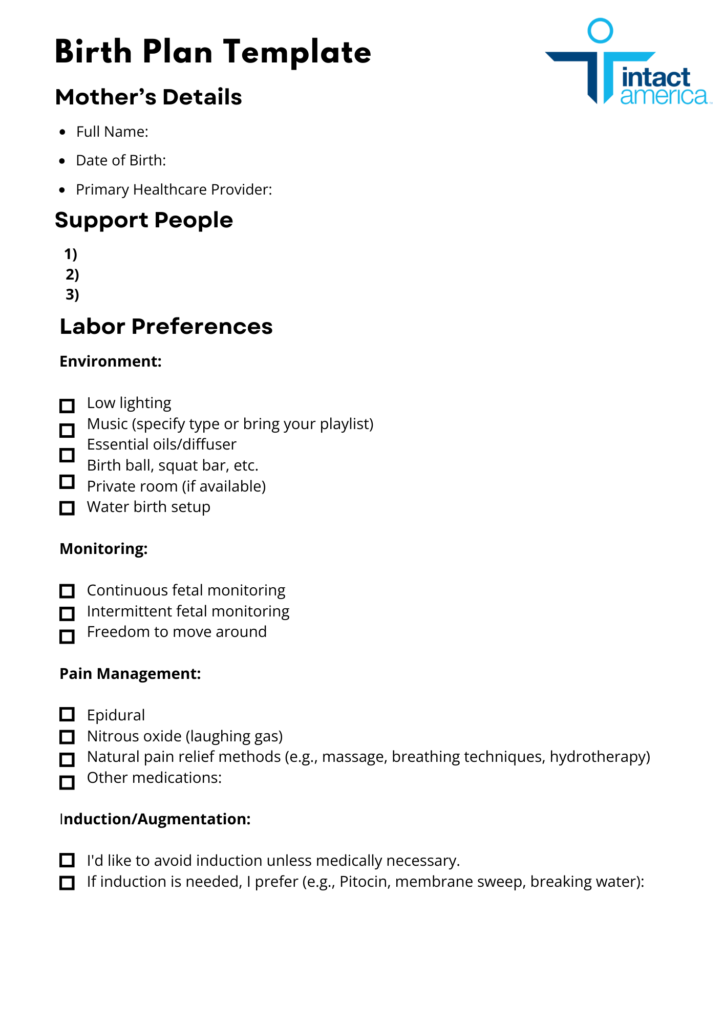
A birth plan checklist is a written document that states what you want and expect during your baby’s birth and post-delivery. It helps your medical team, partner, family, and friends understand your preferences and is your key to creating a personalized birthing experience. Working on a birth plan checklist will help you define and solidify your intentions for your child’s birth and your beliefs about what is best for you and your baby.
Even if unexpected issues interfere with your birth plan, knowing what is important to you will help you deal with whatever changes occur during or after the birth process. If you specify no medication and are given drugs to speed up labor or dull pain, for instance, your team can still follow everything else on your checklist. If you must have an emergency cesarean delivery (c-section) rather than a vaginal delivery, other items on your checklist may provide relief and comfort on the day of birth and in the days to come as you welcome your baby into the world.
A birth plan checklist offers parents, especially mothers, a sense of empowerment regarding the birth process and a feeling of confidence in knowing they have communicated what they want for their child to others involved in the birth process. Make sure to distribute copies of your birth plan well in advance of entering the delivery room.
Items to Consider for Your Birth Plan Checklist
- Where do you want to give birth—hospital, birthing center, home?
- Who will assist with the delivery—obstetrician, obstetrical nurse, midwife, and/or doula?
- Are there medical risk factors for the mother or baby that need to be considered?
- What non-medical pain relief methods do you want to use—breathing, massage, hydrotherapy?
- Who will decide on drug intervention for pain or any other medical intervention, including inducing labor, rupture of membranes, fetal heart monitoring, pain medication, or pain management after delivery?
- Who do you want to be present during your labor and delivery?
- What are your preferences for lighting, sound, and temperature?
- Do you want an epidural? Or, for example, do you want to avoid an episiotomy?
- Who will cut the umbilical cord, and will you save the cord blood and stem cells?
- What do you want done with the placenta?
- Who can hold the baby after delivery?
- Do you want to breastfeed or bottle-feed your baby?
- Will the baby sleep in your room or the nursery?
- Do you want your male baby kept intact?
Why Does Intact America Care About Your Birth Plan Checklist?
One of the most overlooked parts of a parent’s birth plan checklist or birth plan template is attention to whether or not a baby boy will be circumcised. If this decision is not made before the birth of a baby, other factors can create additional pressure to circumcise rather than to keep your son intact.
A groundbreaking Intact America survey found that 94% of mothers were solicited to have their baby circumcised, and 78% of mothers had their sons circumcised if actively solicited to do so by doctors, nurses, and midwives, compared to 45% of mothers who were not asked. The survey, tabulated by Qualtrics, revealed that the circumcision of baby boys was routinely and often aggressively pushed by physicians, nurses, and midwives, even if parents or guardians had not expressed interest in the unnecessary surgery. This egregious (and illegal) level of solicitation increased circumcisions by 173%. Even a “soft sell,” such as giving the mother a consent form to perform the procedure, increased circumcisions by 137%.
Expectant mothers were asked an average of eight times to circumcise their sons.
The survey also found that 21% of mothers who agreed to allow their sons to be circumcised wished they had done more research on the topic, and 10% regretted their choice.
“For years, we’ve heard from parents, especially mothers, about having been pressured or coerced by doctors and nurses to circumcise their sons, but the impact and scope of solicitation has never been measured before. The survey shows solicitation directly and dramatically drives up the infant circumcision rate. Soliciting this unnecessary surgery has to end.”
– Georganne Chapin, author of This Penis Business
Chapin continued, “Doctors tell us they circumcise boys only because parents want it, but this survey proves otherwise. Both doctors and nurses (including nurse midwives) give mothers the impression that circumcision is, if not necessary, ‘normal’ or desirable, so parents agree to permanently alter their sons’ genitals. But they don’t tell parents the whole story: that circumcision is painful, reduces sexual sensitivity for the man the baby will become, and can lead to lifelong trauma.”
In other words, it is up to parents to educate themselves about circumcision before their child’s birth and to stick to it.
Yet most parents do not know what the reality of what circumcision looks like, how it feels to the baby, or the repercussions of this surgery (often referred to as a procedure) on a tiny baby. Most parents do not know that their baby’s foreskin will be pinched and crushed as it is torn from the glans, clamped and cut as it is amputated from the penis. Nor do they know the risks of circumcision. The American Academy of Pediatricians admitted in their 1999 Task Force on Circumcision report that:
“Documented complications include bleeding, infection, recurrent phimosis, wound separation, concealed penis, skin bridges, meatal stenosis, inclusion cysts, retained Plastibell device, sepsis, partial amputation of the glans, and penile necrosis,” as cited by Marilyn Fayre Milos in her book Please Don’t Cut the Baby!
Why This Matters
“The glans at birth is delicate and easily irritated by urine and feces. The foreskin shields the glans; with circumcision, this protection is lost. In such cases, the glans and especially the urinary opening (meatus) may become irritated or infected, causing ulcers, meatitis (inflammation of the meatus), and meatal stenosis (a narrowing of the urinary opening). Such problems virtually never occur in uncircumcised penises. The foreskin protects the glans throughout life.”
From Please Don’t Cut the Baby! by Marilyn Fayre Milos, quoting Edward Wallerstein, author of Circumcision: An American Fallacy
Each year, an estimated 1.5 million baby boys are circumcised in American medical settings. Intact America estimates that if circumcision solicitations were to cease, 600,000 boys—and the men they will become—would be spared every year from the trauma and lifelong consequences of the procedure.
Intact America urges expectant parents, guardians, new parents, and their close relatives and friends to think about circumcision before the baby is born. Once in the hospital, it may be too late to make an informed decision due to the solicitation to circumcise and the lack of information about this harmful, irreversible surgery.
Being proactive will allow you to inform your doctor, support person, and birth team ahead of time about your decision, address any concerns they may have, and find a foreskin-friendly pediatrician. It will also prepare you to answer questions from friends and relatives.
Once your child’s birth is imminent or right after, you will likely be presented with a consent form enabling the hospital to circumcise your son. If you are not presented with a consent form at all – which has happened – before or after birth, something is seriously amiss, so be sure to ask about the form. Check the box for “no” on the form, or make it clear that you do not consent to circumcision. Sign and print your name and ask for a copy of the form for your files. If you are friends with or relatives of someone whose first language is not English or could potentially face translation issues, make certain they are aware of what is at risk.

An Intact America Voices Story About Circumcision Solicitation
(The following personal story was originally published in our voices column)
Hello my name is Sarah, I am 29 years old, I have 2 healthy children (2 & 4), and I was born and raised in Wisconsin which is where we currently reside.
Both of my pregnancies were healthy and full-term, my second was a boy. We didn’t find out gender until birth so when I saw an “anti circumcision” post on Facebook, the question arose in my head if we had a boy; would we be circumcising?
At this point in time, I had thought it was just something you do, I didn’t know why, but instincts were telling me no. I had no hesitation to ask my husband, I was assuming the answer would be yes and I would maybe ignorantly forget about it like most do. However, when I asked him “if we have a boy, will we circumcise him?” and the answer was a quick and simple “no, not necessary,” I felt a great relief. But little did I know the obstacles we would face in the process of bringing home an intact newborn boy in America.
In the following weeks until our green-gendered-baby-turned-blue was earthside, I did a lot of research on circumcision, the foreskin, and the intact penis in general. We were asked by family if we would be circumcising him, and when our answer was no, we faced a lot of backlash. I was asked by my ob/gyn if we would circumcise if it were a boy, and I said no. No further questions were asked.
It wasn’t until our perfect baby boy was born on March 19th, 2020, that I would I be asked no fewer than four times in a single day if we had “decided on circumcision.” Nobody offered any explanation further of the procedure, or any information on leaving my son whole. Although I had just learned about all of this 6 weeks prior and I was still unsure, my answer was repeatedly no, only to hear a mumbling reply about cleanliness, parental preference, and UTI prevention.
The last time they came in looking to take our son, instead of asking they barged in and exclaimed “Okay and it looks like he’s ready for his circumcision!” I banged back with “I SAID NO THANK YOU!” and the nurse turned around and walked out of the room. If I hadn’t been on guard, they would have tricked me into it.
We made it home with our son in one piece, but the way the hospital harassed me about circumcision made me feel bad about my whole birthing experience. I spent the whole time watching my son like a hawk, terrified they were going to sneak my baby to a circumstraint board.
Today our son is 2 years old and perfectly healthy. He has never had a single foreskin problem to-date, and I have never been prouder of not only a parenting decision but for my husband coming forward and making sure we broke the cycle with our son. Intact America is just one of the many fantastic organizations that I have been honored to come across in my journey to help educate others about the harms of circumcision, the benefits of staying intact, and the importance of bodily autonomy.
— Sarah Zeimet






No Comments